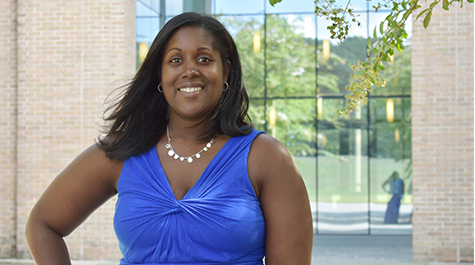Janise Parker joins W&M school psychology faculty
This fall, the School of Education will welcome two new faculty members. Last week, we profiled Daniel Gutierrez, assistant professor of counselor education. Today, we introduce Janise Parker, who joins us as assistant professor of school psychology.
Tell us a little about your background and what brought you to W&M.
Up until this point, I would say that I’ve been a “die hard” Floridian. After earning my bachelor’s degree in psychology from the Florida State University (FSU), I earned by master’s degree and Ph.D. in school psychology from the University of Florida (UF). I then completed a two-year postdoctoral appointment at the University of South Florida (USF).
During my time at UF, I was heavily involved with a research grant examining Response-to-Intervention (RtI)/Multi-Tiered System of Supports (MTSS), which is a framework for providing academic, social-emotional and behavioral support of increasing intensity to school-age students. The project allowed me to receive specialized training in the unique application of RtI/MTSS at the secondary level and to collaborate with faculty and administrators at the P. K. Yonge Developmental Research School, a laboratory school in Gainesville.
Much of that work focused on the refinement of their MTSS process at the elementary and secondary levels. Considering my passion for supporting adolescent learners, I helped the school’s leadership team develop a more systematic approach for providing targeted and intensive counseling support for the secondary students, and implement school-wide preventative initiatives aimed at improving the middle and secondary students’ social-emotional well-being.
After finishing my doctoral studies at UF, I worked as a post-doctoral fellow at USF, doing both research and teaching. I taught several school psychology graduate courses while serving as the practicum coordinator for the first- and second-year school psychology specialist and doctoral students. I conducted collaborative research projects with core faculty members focused on culturally responsive practice in school psychology, and on secondary students’ motivation, engagement, emotional well-being, and academic success. I also provided 20 hours of weekly group and individual therapy for middle and high school students in the local school districts.
My research and clinical experience has largely focused on supporting at-risk adolescents through school-based interventions and considering how students’ cultural and demographic backgrounds impact their motivation, engagement, and overall well-being in school.
As such, I was impressed by the William & Mary School of Education’s strong commitment to actionable research, school-university-community partnerships, and cultural competence and diversity. I chose to come to William & Mary because I genuinely believe that my research agenda will be supported and further cultivated during my time here.
I was also drawn to William & Mary after learning about opportunities for collaborative research among faculty members from various disciplines. As a school psychologist, I believe that collaboration between diverse professionals helps promote positive outcomes for school-age students. Because much of my research focuses on students’ engagement and motivation in the classroom, I am especially looking forward to collaborating with teacher education faculty members.
What’s your area of research and what question are you most passionate about answering right now?
I have two main areas of research. First, I am most passionate about examining student engagement and motivation among adolescent males. My research in this area is primarily guided by Self-Determination Theory, which focuses on individuals’ internal motivational drive. Much of the school-based research pertaining to self-determination has been conducted with students with disabilities, but I strongly believe that helping all students develop self-determination is paramount, especially vulnerable populations such as adolescent males.
So, I’m investigating the extent to which high school students’ use of key self-determination skills, such as goal setting and self-advocacy, predicts their academic engagement, and if/why adolescent males without disabilities might be less likely to utilize key self-determination skills to improve their academic outcomes. Ultimately, I would like to share key research findings with high school educators to help classroom teachers keep teenagers on the path towards graduation.
My other primary research interest is in culturally responsive practice in school psychology. Within this research strand I am particularly interested in investigating how school psychologists deliver and are prepared to deliver culturally responsive services in public-school settings.
I am especially looking forward to examining school psychologists’ capacity to provide culturally responsive services to youth and families who express a strong commitment to their spiritual and religious beliefs. Reflecting on my own professional practice and conversations I have had with colleagues, I’ve observed that some school psychologists are uncomfortable with addressing religion and spirituality when students and parents reference the importance of faith in their day-to-day lives. I hope to build schools psychologists’ capacity to address this aspect of diversity through my research.
Which class are you most looking forward to teaching?
I am most excited about teaching the Practicum in School Psychology and Prevention and Intervention within Public Schools. School psychologists can have a tremendous impact on the lives of diverse students who might only receive supportive services in the school setting. I enjoy helping my graduate students learn how to deliver those high-quality interventions in the schools. I also love supporting their field-based training experience, which can be uncomfortable and perplexing at times. I have a lot of experience providing interventions to students in public schools, so I am really excited about helping our students gain the competence and confidence they need to do the same.
What else are you hoping to get involved with on campus?
I am hoping to get involved with any efforts aimed at supporting first-generation and underrepresented students enrolled at William & Mary. I am where I am today because of my mentors, and I would like to help and mentor students through their college experience as well. I now know what I didn’t know I needed to know to reach my professional goals, so it’s my hope to transfer that knowledge to students who might not have the social capital they need to realize their dreams as well.
